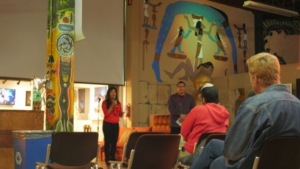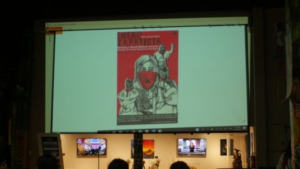On Jan. 4, members of the San Diego community gathered to commemorate the beginning of the 15th annual Enero Zapatista community festival. The event, hosted by the Enero Zapatista organization, goes the entire month of January to celebrate and remember the Zapatista uprising that occurred Jan. 1 to Jan. 12, 1994.
Seven Zapatista principles
Enero Zapatista centers each event in one of the seven Zapatista principles: (1) Lead by Obeying, (2) To Represent; Not Replace, (3) To Work From Below and Not Seek to Rise, (4) To Serve; Not Self-Serve, (5) To Convince; Not Conquer, (6) To Construct; Not Destroy, and (7) To Propose; Not Impose. Each organization contributing to the month of Enero Zapatista is assigned one of the seven principles. The opening event took place at The World Beat Center, and more importantly, on Kumeyaay land.

The opening ceremony began with a native-led Kumeyaay prayer. The speaker strongly emphasized the importance of reclaiming one’s lost language: “Indigenous people around the world are struggling to keep our culture, our language, our history, our ways of life.”
A brief description of the Zapatistas and their struggle followed. It was emphasized that the Zapatistas are not exclusively anarchist or Marxist. The Zapatista Army of National Liberation has created a movement with many aspects to suit the needs of the indigenous in Chiapas.
A fight to preserve the indigenous people of Mexico
With that in mind, the Zapatista struggle, according to Enero Zapatista, transcends any ideology as a fight to preserve the indigenous people of Mexico. This movement is international in nature as well: “As we gather to build a world without borders, we are conscious that it starts with the decisions we make and [that] our local action has a global impact.” After the prayer, a brief film described the Zapatista uprising.

Then, seven discussion groups, based around each of the seven principles, were formed. Each group introduced its assigned tenet to help those attending the commemoration identify with the tenet through their own personal experiences. Ideas discussed ranged from community policing to border elimination and an international approach to structuring society.
This opening event marks the anniversary of just one of many struggles for liberation that have taken place around the world. It is important that in the coming month we not only remember and learn from the great Zapatista uprising but use the conclusions and lessons of previous liberation movements to help in our current struggles. There is no blueprint for revolution, but progress can only be made by analyzing previous mistakes and successes of the many movements that have taken place. The Zapatistas represent a positive force for our continuing struggle against capitalism.





